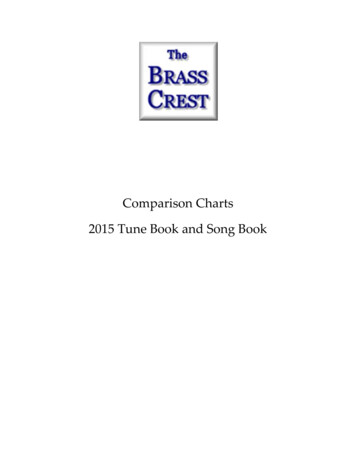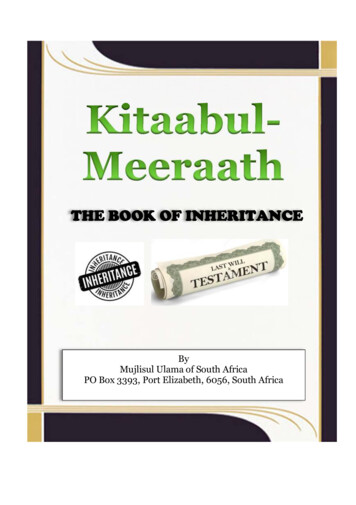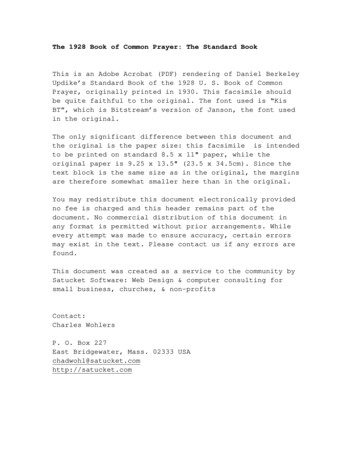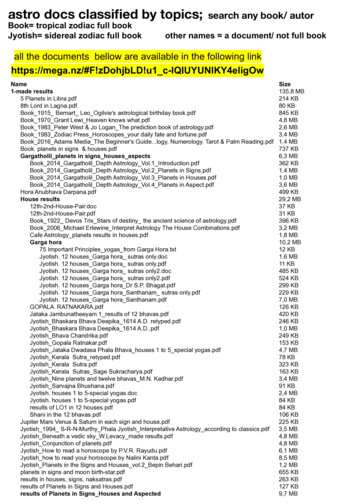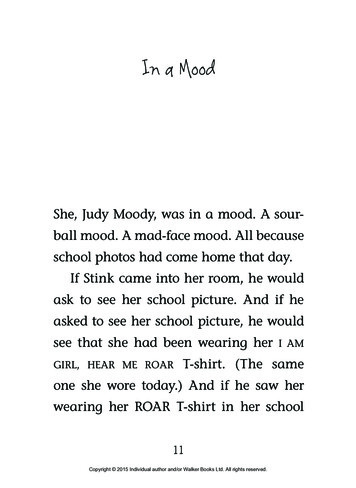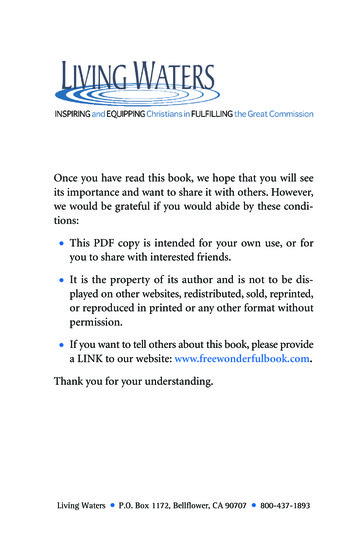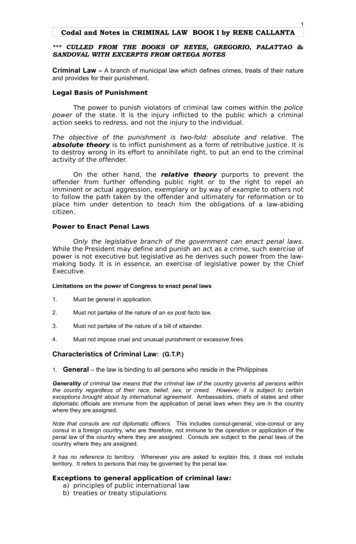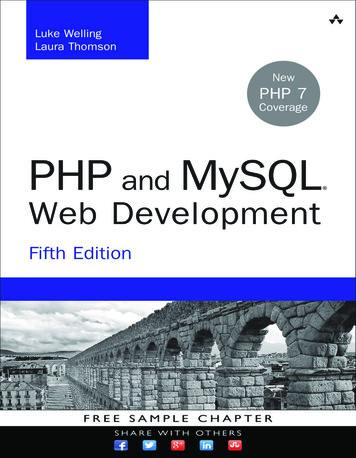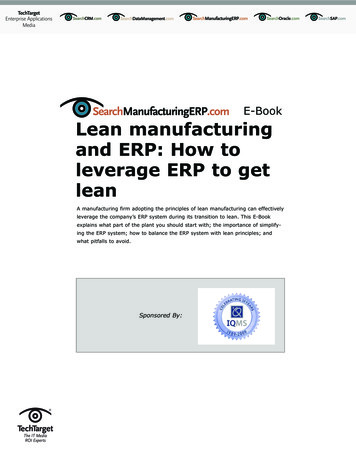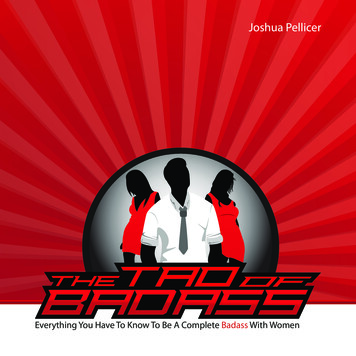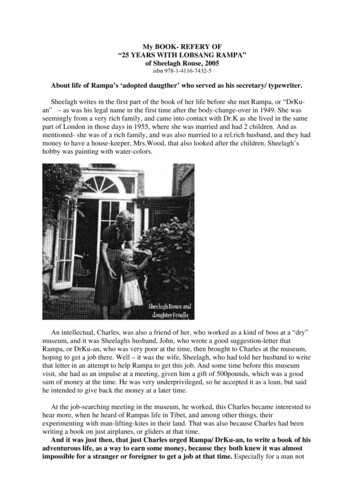
Transcription
My BOOK- REFERY OF“25 YEARS WITH LOBSANG RAMPA”of Sheelagh Rouse, 2005isbn 978-1-4116-7432-5About life of Rampa’s ‘adopted daugther’ who served as his secretary/ typewriter.Sheelagh writes in the first part of the book of her life before she met Rampa, or “DrKuan” – as was his legal name in the first time after the body-change-over in 1949. She wasseemingly from a very rich family, and came into contact with Dr.K as she lived in the samepart of London in those days in 1955, where she was married and had 2 children. And asmentioned- she was of a rich family, and was also married to a rel.rich husband, and they hadmoney to have a house-keeper, Mrs.Wood, that also looked after the children. Sheelagh’shobby was painting with water-colors.An intellectual, Charles, was also a friend of her, who worked as a kind of boss at a “dry”museum, and it was Sheelaghs husband, John, who wrote a good suggestion-letter thatRampa, or DrKu-an, who was very poor at the time, then brought to Charles at the museum,hoping to get a job there. Well – it was the wife, Sheelagh, who had told her husband to writethat letter in an attempt to help Rampa to get this job. And some time before this museumvisit, she had as an impulse at a meeting, given him a gift of 500pounds, which was a goodsum of money at the time. He was very underprivileged, so he accepted it as a loan, but saidhe intended to give back the money at a later time.At the job-searching meeting in the museum, he worked, this Charles became interested tohear more, when he heard of Rampas life in Tibet, and among other things, theirexperimenting with man-lifting-kites in their land. That was also because Charles had beenwriting a book on just airplanes, or gliders at that time.And it was just then, that just Charles urged Rampa/ DrKu-an, to write a book of hisadventurous life, as a way to earn some money, because they both knew it was almostimpossible for a stranger or foreigner to get a job at that time. Especially for a man not
longer young and vigorous, as Rampa or DrKu now was. But at first he only rejected theproposal of book -writing.But he had no other option, so when Charles invited him to join him at a meeting with apublisher, he should just have a meeting with - regarding his own book, and Rampa or DrKuan went with him.The first meeting with the publisher, mr.Banks went well, as this publisher was very eagerin getting out a book written by a Tibetan lama, about life in Tibet, a land the world knewvery little about, though researchers wordwide were curious about it.But he had much to do, as he was reading incoming book- manuscripts, and when Rampasome few weeks later gave him his first writings, Rampa only gave him relative shot time tolook them thru. So under this pressure, this ‘book man’, mr. Cecil Banks, immideately startedto read the writings of this Tibetan, and was at once taken by its contents.It was Rampa himself who later told Sheelagh about this meeting, and she had also aninvitation to a café-talk with ‘mrs DrKu-an’ about at this time, where she was invited to visitthem in their poor surroundings in Queensway part of London.DrKu-an himself was some time later, on visit to John and Sheelagh in their housejust north of Kesington Gardens with this first chapter and he wanted them to look thruit, as he himself was a foreigner. Sheelagh writes she couldn't understand how he was ableto concentrate and write under those noisy circumstances in which he lived, where they andthe poor neighbours in every direction, heard every sound or noise from all else, including theclattering on the old typewriter of Rampa. This last made them knock in his walls, and frombelow – thru his floor at all times. But he could seemingly hold it outside of his mind, andwent on writing. This she saw at her first visit by them.Well – she should read thru it – and did not beforehand know what it said, but wasimmediately taken by its content when she started the reading. As she lived only 15 min walkfrom Rampa and wife, she sometimes visited them in their poor and noisy living conditions.She at first was shocked to find such a poor quarter so near to her own home! Yes, howcould he find peace and concentration to write under such conditions?! The smell of mouldwas everywhere, and worn out paint. But inside their room, the nice smell of incense wasmaking a rather different atmosphere. But this was not the normal situation; only because ofher visit had they burnt it – their one and only incense. Yes - they were very poor.Some net-pictures of this region in London, near Queensway, acc.to net-search for thistimeperiode:
Some time later Sheelagh was feeling sick, and though she did not tell Mr.Rampa this, hejust felt it and expressed so. And he also asked to make an astrological study of her, whichwas done, when she had got the right time of birth from her mother.*The book came out and almost immediately became a success. At this time Sheelaghmoved out of the house of her spouse, John, as she had need of more time for herself for aperiod. The children was placed by her mother, and she stayed most of her time by theRampas, which by now at this time had become their official name – at least for him.Time went and soon his books had been published in some years and made muchcommotion and interest worldwide.At this time Sheelagh also gave birth to her 3'd child - a boy. But the mother-instinct couldnot have been very strong, as she continued to stay away from her husband and the 2 otherchildren, but seemingly she had frequent contact to them. But she had, one can see in theaftertime - a very important role in this mission to bring the eastern/Tibetan knowledge,wisdom into the west. Yes, in this way thru the Rampa-books, so her ‘dharma’ or life-taskwas evidently her secretary- role in this.*In the timeline, they now all – including Sheelagh - moved to a furnished flat in Dublin,Ireland. It was one of the best time-periods in R’s writing she mentions. And here she partlyuse many words to describe uninteresting, insignificant, things in this book, as I evaluate it.*About simultaneous he began more into the aura investigation, but they thought it wasdifficult to get new people to test it on. Preferably nude and young girls, as they have muchbrighter auras, acc.to book. - But not so. The exposures on aura- photographing, was on long
time-settings she mentions, but they had problems getting sensitized film. The cameras backthen, were not automatic, and Rampa was keen to get Sheelagh to learn how to operate them.By this point in time, he dictated the books into a tape-recorder, and she was typing themlater. He dictated very clearly she writes in the book.Sometimes they were told to not to speak for some minutes, when he received telepathicmessages.And he often repeated to them, “the middle way is the only way. If you are too good, youcan’t remain here (on earth), and it is never a good idea to be too bad, it catches up on you!”They sometimes rented a car and drove out to Wicklow Mountains, picture below, or to thecoast.She also talk about the jealousy between the 2 ladies “in the Rampa-family” in this book,and the sometimes sarcastic commentaries from the old one of them. One occasion mentionedin this connection, was when he gave an old gold-watch to the young of them.The lived in Nassau Street in Dublin by this time she writes. See picture down from thistimeperiode, but people here are not connected with the book.Nassau Street in DublinAt a time – after some quarrel/down-time with rampa-wife, she went out and accidentalsocalled, met an old acquaintance from London, who after some talk tried to speak her awayfrom her connection with the Rampas. But she rejected his invitation to leave them.*
She also talks on his hobby on building ship models and model-railroads, where-to he alsobuilt .From page 127: .signals, buildings, towns, mountains, trees, animals, people, a mininature world in fact. Wewould have two or three trains running at a time, the trick being to keep them all on theirrespective tracks and to stop the cats from derailing them.“On the way to Dublin we would often drive on a sandy stretch of beach, Clontarf it wascalled, and as frequently got into trouble with quick sands. Mercifully and amazingly, wenever completely lost the car, although we came near once or twice! Chen had a boyish,daredevil streak which made life amusing and nerve-wracking by turn. I have distinctmemories of seeing the minute vehicle visibly sinking while we struggled with shovels, or amI dreaming? Life was never dull.now the Rampas had some money tohave a simple car – such a Heinkel –for 2 passengers – here placed at thebeach they often visited acc.to book.Here such a car placed on the sandbeach – from/on a picture found onnet, but remark this was not just theirparticular car, which probably was ofa different colour. They also had arow-boat by their rented house nearthe sea at their time there, shewrites.(illustration not from book).“It must have been on the sands at Clontarf, this one particular day that comes to mind. Wewere photographing model ships that day, something we did for a time, making them realisticon film by arranging small locks, placing the models in pools of water simulating the ocean,everything to size. We must have been resting. I can see in my mind's eye a far off image ofChen idly scooping up a handful of sand and letting it trickle through his hand. He had startedto call me Buttercup. It amused him to give nicknames, I was to have several during the yearswe lived together."See these tiny grains of sand, Buttercup? Our lives are no more than that, no moresignificant or important when seen in the real scale of things, and a life is over in the wink ofan eye. But - without each tiny insignificant grain of sand there would be no beach."He dipped his hand in the pool, and let the water run through, drop by drop."When you come to the end of life you'll see it as it is, as no more than a drop in the ocean.When you come to the end you'll see before you in a flash all your life. Perhaps we could callthat hell, because we are seldom proud of what we see. We are had judges, you know, when itcomes to judging ourselves, and we do judge our selves, we are not judged by a God, as somereligions teach. There is no God waiting for you like a benevolent or strict old gentleman, nohost of angels, unless it is delusionary, because your religious belief demands such a delusionfor a time after death until you are ready for truth. Your own Overself is your God, the oneto whom you pray, and you return to that entity — to your Higher Self or Overself — at
death, taking back the experience you have gained while living on Earth. You leave yourphysical body behind just like an old suit of clothes. It served your purpose for that particularlife, you have no more need of it."He sighed, and paused before continuing. "I maintain that life on earth is too hard, it's so hardthat it often teaches nothing. Do you realise that a huge proportion of humanity exists inappalling conditions, they long for death, how can they understand that it all has a purpose?"He fell silent, gazing into the distance. I was aware of a surge of concern and empathyemanating from him, but not hopelessness. For him there was always hope.I said nothing. The small boat we had been photographing bobbed and turned in the shallowpool, and I watched it as I tried to assimilate what he had just said. I recall that it was hardthen to understand concepts which now are completely obvious. When you can look back andremember, it is only then that you grasp the reason for a long life, the time given to you toprogress and find your own truth. Some may reach that point sooner than others, but it seemsthere is always a little more just beyond one's comprehension. It brings to mind lines by theArgentian poet, Alejandra Pizarnik end extract of this direct from book.At one time there, Sheelagh came back from a bicycle ride, when a lot of people weregathered outside their house, but she soon found out they were press-men who were seekingmore to write on - spinning rumors on the family. She bought a news-paper and red the wildinvented things they wrote on them, and then she took a plane to London – intending to clearthings up, but soon found out it was little she could do in the situation then.She also writes that the constant attacks from the press, meant that he could not write 'withheart' after this, -so that only 3.eye actually was ‘from the heart’.picture- they also lived near this bridge;AMBASSADOR BRIDGE – at a time.She also writes that the constant attacks from the press made him in continuous defenceposition, and not able to write from ‘the heart’ after 3.eye was published.They discussed the need to write a book of the process of transmigration or the body-changeover, and in this book from Sheelagh, she writes that the old lady in the house ment the worldwould not understand this thing. But as we now know, the book (-s) on this was written. (TheRampa-story and ‘as it was’ /all)
Regarding the books – here also says that only the first 4 was printed in hardcovers, and therest in soft-covers or paper-backs as also called. And that they all had very good connectionsto that interested and then, new publisher.At a time, the house they rented was to be sold, and then they decided to move to Canada.That move happened Christmas 1959, when they moved to Windsor, a small city, Tecumseh,by the lake St.Claire. A man they knew from the time in London, ‘Paul’ - had found thishouse for them there. They stayed in that house for only some few months, before they movedto Windsor. Picture below from 1960They moved a lot, and was a time at Fort Erie. At that time a boy in England made suicide,and a book of Rampa was found by his bed, and when that came out, the press used this to'blacken him' and his books, which they saw as pure imagination. But this ill writing on him,made the book income
“25 YEARS WITH LOBSANG RAMPA” of Sheelagh Rouse, 2005 . isbn 978-1-4116-7432-5 . About life of Rampa’s ‘adopted daugther’ who served as his secretary/ typewriter. Sheelagh writes in the first part of the book of her life before she met Rampa, or “DrKu-an” – as was his legal name in the first time after the body-change-over in 1949. She was seemingly from a very rich family, and .
